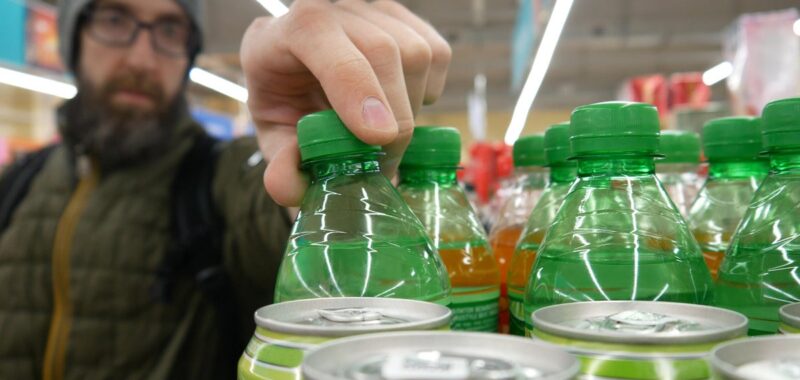The federal food stamp program is facing scrutiny in some states that want to block enrollees from using their government benefits to buy soda and candy.
Three Republican-led states — Arkansas, Idaho and Indiana — on Tuesday moved to ban purchases of soda and candy with benefits provided by the Supplement Nutrition Assistance Program (SNAP). Those states have a combined total of roughly 1 million residents on SNAP out of the program’s total 41.7 million U.S. participants.
Other states are also likely to restrict SNAP recipients’ food purchases, experts say. Lawmakers in states including Arizona, Kansas and Tennessee have introduced similar measures to curtail food stamp purchases of sugary foods and drinks.
The rationale for such legislation is the view that blocking low-income Americans from using food stamps on soda and candy will help improve their health. But anti-hunger advocates say that these restrictions will add to negative perceptions of receiving food aid, while also being unlikely to improve recipients’ eating habits.
“It’s stigmatizing to say, ‘You who are low income, we don’t trust you to make the right choices,” said Gina Plata-Nino, the SNAP deputy director at the Food & Research Action Center, an anti-hunger research group.
Instead, she said, these states would be better off focusing on the biggest obstacle to healthy eating: the high cost of groceries, particularly the expense of fresh fruits and vegetables.
Because SNAP provides an average individual monthly benefit of $187, or a little over $6 per day, many recipients fill up by purchasing the cheapest, most calorie-dense foods they can afford, she added.
Grocery costs soared during the pandemic, surging almost 24% from 2020 to 2024 and outpacing overall inflation by almost three percentage points, according to an analysis from the U.S. Department of Agriculture.
Food prices aren’t expected to drop anytime soon, with the USDA forecasting that groceries could rise 2.7% in 2025, adding to the challenges SNAP recipients face in affording healthy food.
Make America healthy again?
In announcing plans to block food stamp purchases of soda and candy, Idaho Governor Brad Little on Tuesday proclaimed that the state “welcomes the MAHA movement,” referring to the “make America healthy again” movement started by U.S. Department of Health and Human Services Secretary Robert F. Kennedy Jr.
Arkansas Governor Sarah Huckabee Sanders credited the Trump administration with placing “a laser focus on solving America’s chronic disease epidemic,” saying that banning candy and soda from food stamp purchases is “a great place to start.”
About 80 cents of every $1 in SNAP benefits is used to purchase staples like meat, bread, milk, cereal and rice, with the remainder going to salty snacks, candy and sweetened beverages. Households that rely on food stamps have very similar patterns of spending to households not on food stamps, according to the Brookings Institution.
The Arkansas plan, which would take effect in July 2026, would exclude soda, including no- and low-calorie soda; fruit and vegetable drinks with less than 50% natural juice; “unhealthy drinks;” candy, including confections made with flour, like Kit Kat bars; and artificially sweetened candy.
It also would allow participants to use benefits to buy hot rotisserie chicken, which is excluded from the program now under the SNAP program’s longstanding ban on hot foods. Food stamp recipients also would be barred from using their benefits to buy nonfood items, such as soap or toothpaste, as well as alcohol or tobacco.
Some industries are pushing back against the SNAP restrictions. Representatives for American Beverage accused state and federal officials of “choosing to be the food police rather than take truly meaningful steps to lift people off SNAP with good-paying jobs.”
The National Confectioners Association called the approach “misguided.”
“SNAP participants and non-SNAP participants alike understand that chocolate and candy are treats — not meal replacements,” spokesman Chris Gindlesperger said.
“Taxpayers are subsidizing poor health”
Over the past two decades, lawmakers from both political parties have proposed halting SNAP payments for everything from soda to steak. To date, however, the U.S. Department of Agriculture, which administers the SNAP program, hasn’t granted the required waivers for states to curb food stamp purchases.
But the Trump administration is signaling that it will grant the waivers requested this week, with USDA Secretary Brooke Rollins saying in a Tuesday statement that she plans to quickly approve Arkansas’ request.
“I have said since my confirmation that USDA has a role to play in improving nutrition programs to better serve individuals in need of support, all while recognizing the generosity of the American taxpayer,” Rollins said in a statement to CBS MoneyWatch. “Our shared goal should be to lift millions of Americans out of dependency and into hopeful futures and insert new energy and ideas into long-ignored programs like diet-related, chronic disease.”
Blocking SNAP purchases of candy and soda wouldn’t keep recipients from using their own money to buy such items, as food stamp benefits typically pay for roughly two-thirds of a household’s grocery costs.
But advocates of banning unhealthy foods from SNAP say that taxpayers shouldn’t be on the hook for supporting bad eating habits.
“Taxpayers are subsidizing poor health,” Sanders said Tuesday at a news conference with Rollins in Little Rock, Arkansas. “We’re paying for it on the front end and the back end.”
contributed to this report.

